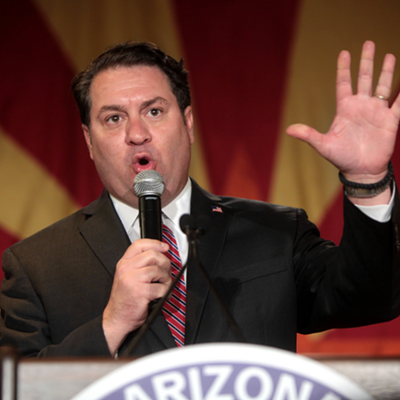FOLLOW THE MONEY
The latest campaign reports are in for the Tucson City Council races, even if we're the only ones who care about such inconsequential details of the campaigns.Here's the scoop: GOP candidates Fred Ronstadt and Kathleen Dunbar, who have declined to participate in the city's matching-funds program, had raised less money than the Democrats who are using the program as of Oct 3, when the last reporting period ended. Dunbar, who is facing Democrat Karin Uhlich, had raised $81,135 and had $65,438 left in the bank for the final month of campaigning. Ronstadt, who is facing Democrat Nina Trasoff, had raised a total of $75,330 and still had $49,883.
The relatively low numbers could mean:
1) The Republicans were holding off on the big fundraising so they don't have to reveal the big donors until Oct. 27, when the next round of reports is due;
2) The Republicans thought they'd be able to raise more money, but wallets have been tighter than they expected; or
3) The Republicans never intended to go on the big ol' spending spree of special-interest money that Democrats have been accusing them of for the entire campaign.
Our guess? Mostly No. 2 , with a twist of No. 3. Your mileage may vary.
Trasoff had about $46,600 left in her campaign account, while Uhlich still had about $50,000. Look for a barrage of propaganda to be coming your way.
MUSICAL CHAIRMEN
In other campaign-finance news: Tucsonans for Bipartisan Government, the independent campaign that's supporting the unlikely slate of Democrat Steve Leal and Republicans Fred Ronstadt and Kathleen Dunbar, has a new chairman. You don't suppose this is some sort of effort to confuse and mislead voters, do you?Just a week after filing the paperwork to create the committee, apartment developer Roger Karber has bailed out as chairman of the committee. Wonder if it has something to do with that big apartment project he wants to do downtown? Given that Leal--who is definitely headed back for a fifth term--seemed kinda pissed off about the whole effort to "support" him, maybe Karber figured the gig wasn't so good for business.
In his place is Ross McCallister, another apartment developer who is equally media-shy. We gave him a call earlier this week to ask him about the committee, but we don't really expect he'll call us back. We're willing to bet McCallister isn't the brains behind this plan; he's just a stooge for the real backers of this effort.
And who are the real Powers That Be in this case? We're not sure yet, because the group strategically delayed collecting any contributions through Oct. 3, which was the end of the last reporting period. In a couple of weeks, we'll check back to find out who the men behind the curtain really are. Want to bet we'll see the Growth Lobby's fingerprints all over this one?
STREET TALK
The Regional Transportation Authority has wrapped up Phase 2 of the public comment period, although if you've still got something to say, you can head over to rtamobility.com to speak up. Of course, since the final tweaks in the plan are being made, your two cents will be probably be worth just about that much.Between the two comment periods, roughly 1,000 people bothered to give the RTA feedback on the plan--which, when you consider there are about three-quarters of a million of us in the metro area, is a pretty lame response.
Over the next couple of weeks, the rubber is going to hit the road if the RTA is going to make the deadline of wrapping the plan by the beginning of December so voters can decide in May if they want to support a half-cent sales tax to pay for it. The RTA has some tough choices to make because costs are still outpacing revenues. (And--no offense to the hard-working number crunchers at the RTA--the way construction costs are climbing, we're cynical enough to suspect the estimates are gonna turn out too low.)
A couple of budget-balancing options are floating out there:
1) Focus on intersection improvements along Grant Road between Oracle and Swan roads, rather than widening the street to six lanes. It won't move traffic as well, but it will be cheaper than the currently estimated $175 million. And it will calm some of the plan's critics who are freaked by the thought of losing all those Los Betos locations.
2) Give up on the eastern end of Barraza-Aviation, which would extend the parkway along the western edge of Davis-Monthan from Alvernon Way to Interstate 10 near Valencia Road at a cost of $178 million. Instead, the RTA may just acquire some right-of-way and then try to persuade the state to pay for a highway, especially since it could ease congestion on I-10, which is a state responsibility.
3) Ask jurisdictions to surrender some of the money that now comes from the state and gets distributed by the Pima Association of Governments. Because, after all, the City of Tucson already has so much money for transportation that it can afford to give some up, right?
ALL ABOARD
Speaking of the RTA, the city appears ready to settle on an urban streetcar as the preferred alternative for high-capacity transit between University Medical Center and the downtown's Rio Nuevo project. Both a citizen committee and a technical committee studying options as part of the process to land up to $75 million in federal matching funds say that a streetcar is the way to go, according to Tucson Transportation Director Jim Glock.Though the streetcar has been a favorite among many of the folks who have commented on the transportation plan so far, it has its critics, such as Ken O'Day, the Campbell-Grant Neighborhood Association president. O'Day, in recent correspondence with the RTA, says the project should be paid for by the state because the UA will be the big beneficiary of the service.
But Steve Farley, the local rail champion, says although the streetcar will travel through the UA, students and staff won't be the only users. Besides, anyone who wants the state to pay for it is essentially looking for ways to kill it. As Farley says: "Good luck getting the state to pay for it."
BILLBOARD BULLETIN
Pima County Administrator Chuck Huckelberry tried to persuade the Pima County Board of Supervisors to go with another settlement with Clear Channel regarding all those billboards that may or may not be illegal.The latest agreement would have taken down about 40 of the 120 or so billboards located in the unincorporated areas of the county.
Chris Straub of the Pima County Attorney's Office, who has been negotiating with Clear Channel on the agreement, says that it would resolve outstanding problems without attempting to litigate each and every alleged billboard violation.
But Mark Mayer, the town's most fierce anti-billboard crusader, persuaded Democratic Supervisors Sharon Bronson, Richard Elias and Ramon Valadez to reject the agreement and take Clear Channel to court.
Republicans Ray Carroll and Ann Day supported the settlement, saying it would bring down a bunch of billboards without litigation.
Straub isn't sure the county will prevail in what promises to be a drawn-out legal fight, though he's flattered by Mayer's faith in him.








